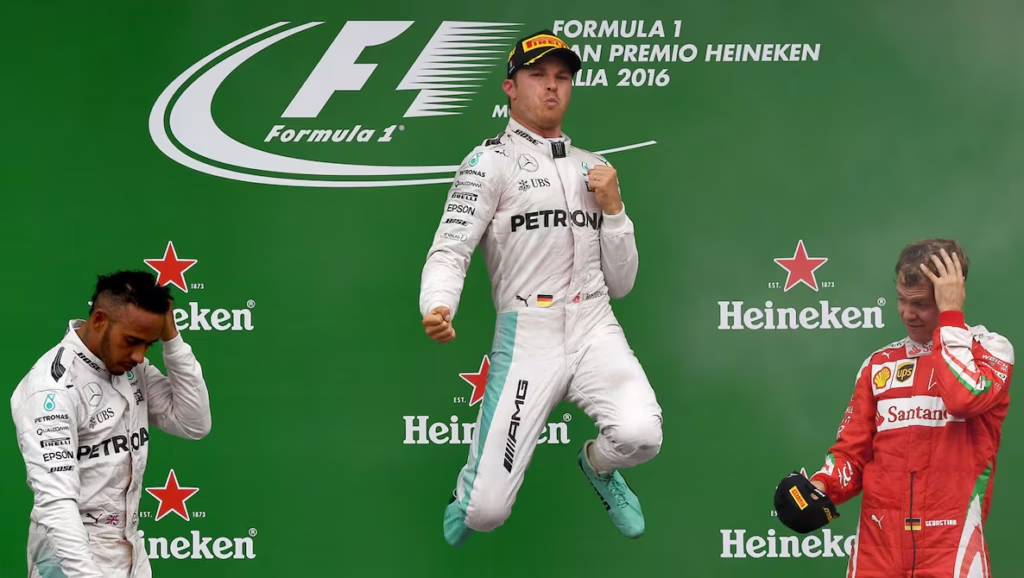Nico Rosberg is best known for winning the 2016 Formula 1 World Championship and ending Mercedes teammate Lewis Hamilton’s streak of dominance. But his career is more than that single triumph. From karting prodigy to fierce competitor, and now a sustainability entrepreneur and commentator, Rosberg has carved out a unique path in motorsport and beyond. His combination of intelligence, discipline, and long-term thinking sets him apart as a driver who mastered both the sport and the decision to walk away from it at his peak.
1. Early Life and Motorsport Heritage
Nico Rosberg was born on June 27, 1985, in Wiesbaden, Germany, and grew up in Monaco. He is the son of 1982 Formula 1 World Champion Keke Rosberg, making him one of the few sons of a former champion to follow in his father’s footsteps.
Although Finnish by heritage, Rosberg raced under the German flag. Multilingual and academically inclined, he considered other paths but ultimately chose motorsport, inspired by his father’s legacy. He excelled in karting and moved through the junior formulas, winning the inaugural GP2 Series title in 2005. His analytical mind and technical feedback stood out early in his career.

2. Formula 1 Debut and Early Years with Williams
Rosberg made his F1 debut in 2006 with the Williams team. In his very first race, he scored points and set the fastest lap—an impressive entrance for a rookie. Over the next four seasons, he developed into a reliable and consistent performer, although Williams lacked the machinery to challenge for podiums or wins regularly.
His time at Williams built his reputation as a cerebral and professional driver, known for understanding data and working closely with engineers to maximize car performance.
3. Joining Mercedes and Building Momentum
In 2010, Rosberg joined the newly reformed Mercedes GP team, which had just taken over Brawn GP. Partnered initially with Michael Schumacher, Rosberg often outperformed the seven-time world champion, further enhancing his credibility in the paddock.
When Lewis Hamilton joined the team in 2013, the two childhood friends became fierce rivals. From 2014 onward, Mercedes became the dominant force in Formula 1, and the Rosberg-Hamilton rivalry became one of the most intense and captivating in modern F1 history.

4. The Rivalry with Lewis Hamilton
Between 2014 and 2016, Rosberg and Hamilton engaged in a psychological and on-track battle that defined the hybrid era’s early years. Rosberg often matched Hamilton’s pace, but mechanical failures and strategic errors cost him championships in 2014 and 2015.
The 2016 season was different. Rosberg started with four consecutive wins, drove with precision, and capitalized on Hamilton’s misfortunes. The rivalry reached its peak with controversial incidents, including crashes and on-track tensions. Rosberg won the championship by just five points after a tense season finale in Abu Dhabi.
Beating Hamilton, considered one of the greatest F1 drivers of all time, elevated Rosberg’s career to legendary status.

5. Shocking Retirement from Formula 1
Just days after clinching the 2016 title, Rosberg announced his retirement from Formula 1. His decision stunned the motorsport world, as he became the first reigning world champion to retire since Alain Prost in 1993.
Rosberg stated that he had achieved his life’s dream and wanted to prioritize his family. His decision reflected a deep sense of self-awareness and finality—choosing to leave on top rather than continue in a mentally and physically exhausting battle.
6. Post-Racing Career and Sustainability Ventures
Rosberg transitioned smoothly into life after Formula 1. He became a respected pundit and F1 commentator, offering technical insight and strategic analysis. But his main focus shifted to sustainability and green innovation.
He invested in electric mobility, renewable energy, and clean tech start-ups. In 2018, he launched the Greentech Festival, an annual event in Berlin showcasing green technology and climate solutions. He also became an investor in Formula E, the electric racing series, and promoted a vision of cleaner motorsport.
Rosberg has also used his platform to raise awareness about environmental issues, collaborating with sustainable brands and advocating for carbon neutrality.

7. Driving Style and Psychological Strength
Rosberg’s driving style was calculated, clean, and controlled. He excelled in qualifying and was particularly adept on technical circuits. While not as flamboyant as some rivals, his methodical approach and ability to extract consistent performance were key to his 2016 success.
Psychologically, Rosberg developed a fierce competitive mindset. He employed sports psychologists, analyzed his own weaknesses, and worked intensively on race preparation. His mental fortitude, especially in facing Hamilton, was one of the deciding factors in his championship run.
8. Legacy in Formula 1
Though his time at the top was brief, Rosberg’s legacy in Formula 1 is powerful. He proved that discipline, intelligence, and perseverance can rival raw talent. His victory in 2016 broke the narrative of Mercedes being a one-man team and added legitimacy to the team’s engineering dominance.
His early exit also challenged the traditional notion that drivers must race until decline. Instead, Rosberg redefined what it means to leave the sport on one’s own terms—with purpose and clarity.

9. A Champion by Design
Nico Rosberg’s story is about more than just a title. It’s a narrative of strategy, personal growth, and courage. Whether through intense rivalries, surprising decisions, or post-racing leadership, Rosberg has crafted a legacy defined by control, foresight, and integrity.
He remains a rare figure in motorsport—one who mastered the machine, conquered the pressure, and gracefully exited the stage to build something even more meaningful beyond the finish line.
References (APA)
Benson, A. (2016). Nico Rosberg: Why I had to walk away after F1 title. BBC Sport.
Brundle, M. (2017). Rosberg vs Hamilton: Inside the Mercedes rivalry. Sky Sports F1.
Formula 1. (2023). Nico Rosberg – Career profile and stats. F1.com.
Hughes, M. (2022). Nico Rosberg: The Thinking Champion. Motorsport Magazine.
Rosberg, N. (2020). Why I Retired: Reflections on F1 and Life Beyond. Greentech Media.
Smith, L. (2021). The Post-Racing Rise of Nico Rosberg. ESPN Motorsports.
















